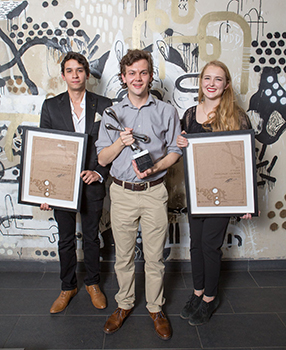
At the PG Bison 1.618 competition awards ceremony
in Rosebank, were from the left:
Camrin Plaatjes from the University of KwaZulu-Natal;
Stephan Diedericks, winner of the competition;
and Margaux Loubser,
the second-place winner. Both Stephan and
Margaux are studying Architecture at the UFS.
Photo: Supplied
Food that reaches its sell-by date in supermarkets is usually disposed of, but has not yet reached its best-before date. What happens to this food? According to Stephan Diedericks, the answer to this is for this food to be repurposed.
Not only does Stephan want to prevent the waste of food – in a world where food security is a challenge – but he also won the prestigious PG Bison 1.618 Competition with his entry in which he suggests that gourmet meals be prepared from food that has reached its sell-by date, and then be served in the Delta Recycletorium.
Students introduced to park lands in urban areas
Diedericks is a student in the Department of Architecture at the University of the Free State (UFS). Second-place winner in this competition was Margaux Loubser, also a UFS student. Another UFS student, Dehan Kassimatis, was a finalist. They received their awards at a ceremony in Rosebank, Johannesburg, earlier this month.
The competition, now in its 24th year, was created to recognise the future interior and industrial designers, architects, and key decision-makers in the South African construction industry. It is known not only for the prestige it offers its winners, but also for the tradition-defying brief given to the students each year.
According to lecturers Kobus du Preez and Zak Wessels, in the Department of Architecture, the competition introduced the students to parklands in urban areas. He quotes the competition brief: “Rural to urban migration with the development of commercial and residential property elevates the importance of parklands within cities, in creating a refuge from the hustle of daily life. These areas are leveraged to encourage healthier living, community interaction and environmental awareness.”
Learning experience more important than prizes
The site that was the focus of the competition is the Environmental Centre, Delta Park Heritage Precinct in Johannesburg. Students needed to transform this old building into a vibrant gastronomic restaurant. “The theme and style of the restaurant was for the student to choose,” said Du Preez.
Loubser called her restaurant Rooted – a wholefood restaurant. She was influenced by the geometries of the original Art Deco building. Rooted articulates and integrates the space between nature and the building. Similar to an Art Deco painting or poster, the landscape is abstracted into terraces which are used to grow vegetables organically. Vertical green screens soften the divide between the building and its surroundings and it provides shade.
“Our students took their clues from the existing environment and integrated it with a single idea, an abstract concept, which impressed the judges,” Du Preez said.
Although this is a competition that is well reported in the industry press, Du Preez and Wessels agree that the learning experience for students is much more important than winning the contest. The competition’s brief aligned well with the Department of Architecture’s learning content with its urban focus.
Jacques Steyn, a UFS architecture student, came third in the competition in 2015.